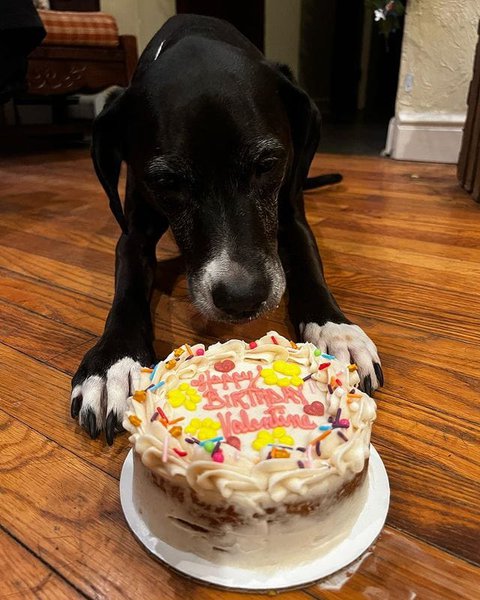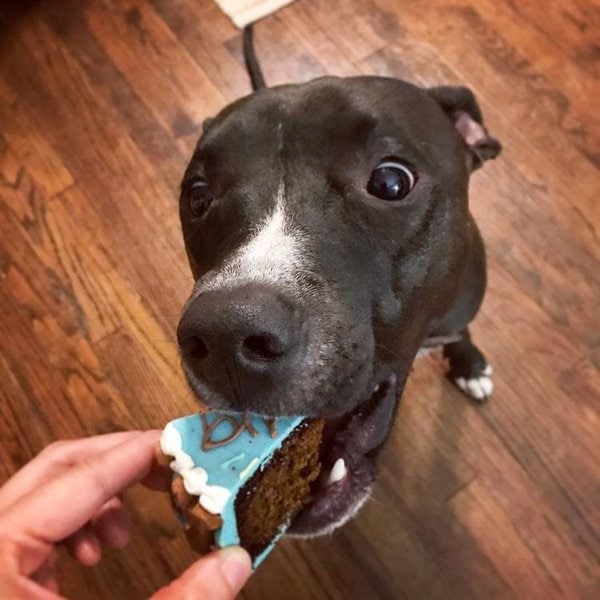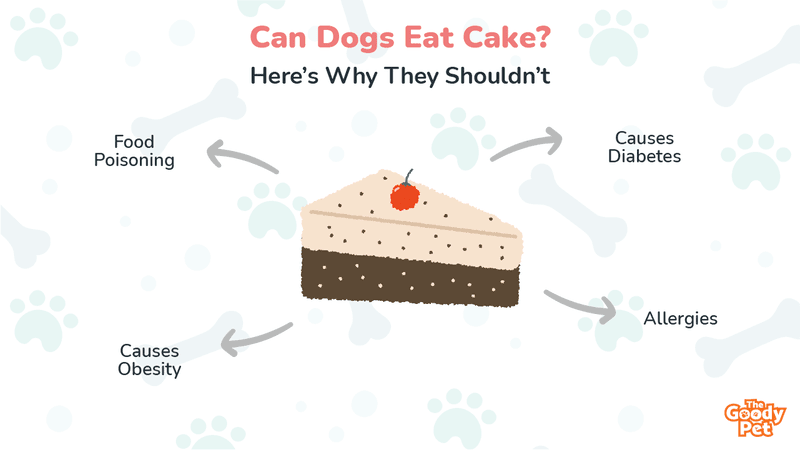Cakes are delectable treats used to crown almost every occasion where there’s a cause for celebration. Since our four-legged companions are an integral part of our family, shouldn’t dogs be joining in on the celebration when we cut and eat cakes?
In general, dogs can eat cakes. However, sadly, most ingredients in a cake, especially sugar, create long-term health concerns like obesity and diabetes in dogs. Also, some cakes, like chocolate and red velvet cakes, contain toxic ingredients that could send a dog straight to the vet or crematory if care isn’t taken.
In this guide, you’ll learn why it’s not safe for dogs to eat cakes, what types of cakes to avoid, what to do if a dog eats cake, and alternative cake recipes that are safer for dogs.
Why Is Cake Harmful To Dogs?

Frankly, the consequences of giving cakes to dogs can be disastrous because there are so many health complications that could arise. Let’s have a look:
Poisoning
Food poisoning is the greatest threat dogs are bound to face after consuming cakes. Since the ingredients in making cakes are so numerous, each could cause different kinds of poisoning in dogs.
Below is a list of various types of poisoning dogs might suffer from due to cake consumption.
Chocolate Poisoning
Every caring dog owner who is careful about their pooch’s diet and who has inquired about substances that dogs must avoid knows that it’s unforgivable to offer chocolate to dogs.
Although the creamy cocoa derivative extract is hands down one of the best food discoveries known to man, sadly, dogs can’t partake in it because it contains a substance called theobromine.
While not harmful to humans, theobromine can drastically alter a dog’s normal nervous system function, destabilize heart rhythms, and cause electric shock-like seizures. The problem with theobromine is that dogs haven’t evolved like humans to handle the diuretic effect—the mental stimulation— that comes with theobromine intake.
Hence, since a great number of cakes made today have at least some bits of chocolate in them, there’s a chance that dogs who consume cakes will have a life and death bout with theobromine.
Caffeine Poisoning
Another stimulant in cakes that adversely affects the central nervous system of dogs is caffeine. Although not common, sometimes cakes contain some element of caffeine that disrupts the coordination of nerves and brain cells in dogs, leading to hypertension, hyperactivity, and panting.
Xylitol Poisoning
Naturally found in many sweet fruits, xylitol is a substance processed into synthetic sugar and used to sweeten drinks and foods like cakes. But research shows that xylitol is a huge threat to dogs, even in minute doses.
This is because the hazardous compounds in xylitol cause a drastic reduction of sugar levels in a dog’s bloodstream, which has an even deadlier effect than high blood sugar.
Since many cake recipes call for xylitol as an alternative to sugar, dog parents should not leave cake slices lying around for dogs to consume.
Alcohol Poisoning
Alcohol poisoning is not a common phenomenon because dogs aren’t attracted to bitter-tasting substances. However, since the harsh taste of alcohol can be tempered by sugar and sweeteners in drinks and food like cakes, there’s the possibility of your pooch ingesting alcohol.
Vanilla Poisoning
Commercially produced vanilla extract contains about 35% ethanol and is a big threat to the sanity and safety of your beloved furry friend. Like alcohol, the ethanol in vanilla acts as an antidepressant, stunning the nerves controlling the lungs, hearts, and brain.
Nutmeg Poisoning
Nutmeg contains a substance called myristicin that’s toxic to dogs when ingested in high amounts. Ordinarily, the quantity of nutmeg needed to bake a standard-sized cake shouldn’t be enough to cause problems for your canine pal. However, since there’s the slightest possibility of toxicity, you ought to be cautious with foods seasoned with nutmeg.
For example, dogs can be quite nasty and go for a sachet or bottle of nutmeg carelessly lying around the kitchen table. If your pooch inhales or licks powdered nutmeg in its raw form, lung irritation and breathing difficulties could arise.
Some other effects of nutmeg to watch out for in dogs are rapid heartbeat, hallucination, incoordination, etc.
Interestingly, although nutmeg contains the letters ‘nut’, it’s a seed and not a nut, contrary to popular belief. Hence, nutmeg doesn’t fall under the dangerous nut category per se but still remains potent enough to destabilize your furry friend’s health.
Nut Poisoning
Often, some cake recipes require ground or broken nuts, some of which pose serious health hazards to dogs.
For instance, some folks mix almonds with other ingredients while baking. Unfortunately, if their dog eats a cake made with almonds, that canine may suffer gastrointestinal distress or, even worse, intestinal blockage.
And that’s because the composition of certain nuts like almonds isn’t that compatible with dogs’ digestive systems, thus causing catabolism troubles.
Other types of dangerous nuts in cakes to watch out for are macadamia, walnuts, and pecans.
Diabetes
Diabetes occurs when there’s too much sugar from cake and other food in your furry buddy’s blood. It could result from the pancreas’ inability to produce enough insulin that checks the amount of glucose (sugar) in a dog’s bloodstream.
When a dog with a malfunctioning pancreas consumes too much sugar—evidently overabundant in cakes—it compounds the existing problem with insulin production, causing blood sugar levels to spike. Once sugar levels peak in excess amounts, they affect cell functionality and damage vital organs like the heart and liver.
Suffice to say that not all dogs who consume cakes will suffer from the detrimental effects of diabetes because there has to be an underlying pancreatic malfunction for the sickness to arise.
However, since you can never tell if a dog’s diabetic until you start to see the symptoms, it’s generally best not to test your canine pal with sugar-laden foods like cakes.
Obesity
Obesity is similar to diabetes, but it’s mostly a function of overconsumption of excess calories from food like cakes and dessert rather than the malfunctioning of an organ.
Obesity occurs when the calorie intake in your pooch exceeds the required amount needed for optimal metabolism. Consequently, the excess calories accumulate in your canine’s system as fat that stretches and takes up additional storage in the muscles.
But the problem of obesity-inducing food like cakes isn’t with sugar per se because dogs can eat small amounts of sugar and get away with it as long as they exercise frequently. The problem with cake is that it requires large quantities of sugar and butter to complete the recipe.
And that’s something that can cause stomach upset and vomiting in minor cases, or joint inflammation and heart failure in severe cases.
Allergies
About 20% of all dogs have allergies. Considering that a cake recipe calls for a combination of many different food substances, it increases the likelihood of your four-legged buddy dealing with not just one but also many potential allergens after consuming cakes.
For example, a study revealed that three food substances are most notorious for causing allergic reactions in dogs: meat, dairy, and eggs.
Evidently, of the three substances listed, diary products and eggs are core ingredients for baking cakes, and more often than not, induce severe allergic reactions in dogs. Allergies can cause itching, blood-colored gums, rapid breathing, etc.
What Types Of Cakes Should Dogs Not Eat?

There are certain ingredients in cakes that spell doom for dogs. In most cases, these ingredients make up the bulk of the recipe and mostly influence the name of the cakes, making it easy for dog owners to identify and avoid.
Here are six types of cakes that are delicious but dangerous to dogs:
Chocolate Cake
Right from the moment you pick them up at the breeder’s corner, the warning remains ever constant, “chocolates can kill your dog.”
Of course, the last thing a responsible dog owner wants to do is feed their pooch with anything that has even the slightest traces of chocolate since it contains an incredibly powerful toxin called theobromine.
Red Velvet Cake
Red velvet is a derivative of chocolate cake and thus contains the same harmful theobromine substance that makes chocolate a deadly treat for dogs.
What’s more, the characteristic red color to this chocolate cake variant, aside from beets, is mostly gotten from the combination of inorganic food coloring chemicals that could prove harmful to your furry buddy.
Vanilla Cake
Vanilla contains enough ethanol to threaten a dog’s existence. And since baking a vanilla cake requires some amount of vanilla, it’s not advisable for your canine to consume this type of cake.
Coffee Cake
Dogs find it difficult to process caffeine and don’t fare well with cakes made from ground coffee. So, you might want to avoid giving your dear Fido any cake made with coffee.
Fruit Cake
A fruit cake is a cake made from several dried fruits, like currants and raisins, that are harmful to dogs in many ways.
The compound effect of dried fruits in a fruit cake could launch a barrage of attacks on a dog’s immune system, destabilizing it on multiple fronts and snuffling out its chance of survival.
Keep in mind that dried fruits are usually steeped in alcohol for days to preserve them for a longer period. Hence, aside from the presence of toxic fruits in the dried fruit mix, the alcohol content also causes intoxication and does its own damage to your dear Fido.
Nut Cakes
Certain cakes like Kentucky bourbon contain harmful nuts that affect dogs negatively. In the case of the Kentucky bourbon, the culprit is the pecan nut that’s notoriously famous for causing juglone poisoning—a kind of poisoning that induces convulsions, vomiting, and intestinal obstruction in dogs.
Juglone is also present in walnuts, and walnuts serve as a tasty ingredient when used to make cakes.
Another notorious nut cake to avoid is the macadamia and almond nut cake because it has a double harmful effect on a dog’s digestive tract.
Can Dogs Eat Cake Icing?
Cake icing isn’t a good option for dogs for several reasons:
First, cake icing is glorified pure sugar, and in comparison to the cake itself, doesn’t offer any health benefits to dogs. On the contrary, it packs enough calories to turn your canine companion into a floating four-legged balloon.
Second, cake icing contains eggs and other ingredients that quickly go bad. Consequently, lots of preservatives go into the icing to keep it longer. Unfortunately, such preservatives negatively affect your pooch since dogs haven’t evolved to process inorganic compounds adequately.
Third, one major recipe in making cake icing is milk, which may cause discomfort or allergies in some dogs that suffer from lactose intolerance.
Lastly, cake icing usually has fruit toppings such as cherries and berries that may present a choking hazard or poisoning in dogs.

What To Do If My Dog Ate Cake?
If your canine pal eats a small portion of pound cake made from vanilla and eggs, you shouldn’t be too worried. What’s required is close monitoring for quick detection of any possible health troubles.
However, if your dear Fido ate one of few ‘forbidden cakes’ like those made with chocolate or macadamia nuts, then trouble brews, and there’s a need to act fast. It would help if you got your canine companion to the vet as soon as possible and explained to the pet doctor the contents of the cake.
Depending on the quantity of cake consumed, the level of toxicity present in the ingredients, the speed of detection and treatment, and the absence or presence of underlying health issues, your four-legged buddy may return home the same day or spend some time with the vet.

What Safe Cake Recipe Can I Use For My Dogs?
If the birthday cake custom runs deep in the family so that dear Fido must have a cake to celebrate, there’s a safe recipe below to use so your dog doesn’t feel left out:
Start by mixing flour or wheat with applesauce or mashed banana in a bowl. Then, add a little bit of sweetener or preferably use honey. Next, add some eggs and oil into the bowl and mix until the batter is smooth and consistent.
Finally, put in a baking pan, and toss in the oven. When it’s ready, bring it out and let it cool on the rack before serving the cake to your dog.
Alternatively, if you’re not up for baking, you could order dog cake online.






